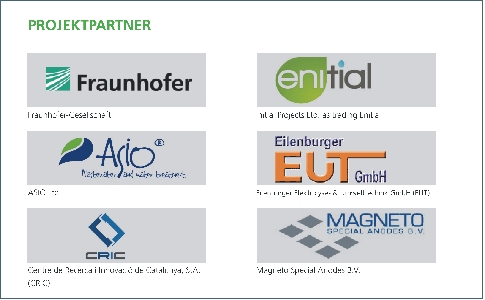Clean Leachate - COMBINED ANODE AND CATHODE PROCESS TO TREAT LANDFILL LEACHATE
Waste disposed in landfill sites degrades over time and produces a liquid waste stream called landfill leachate, which cannot be directly discharged to water courses as it contains many hazardous pollutants. The consortium will develop an automated, modular, mobile leachate treatment system. The treatment will be carried out directly in an advanced oxidation process that uses reactions at both the anode and the cathode of a new form of electrolytic cell that we will develop. The automated, mobile system will offer a flexibility of operation that is currently not available.


PROJECT NUMBER: 262335
PROJECT DURATION: 01.12.2010 – 30.11.2012
Coordinated by Fraunhofer IGB
FUNDING
CleanLeachate is funded under the 7th Framework Programme of the
European Union in the programme Research for the Benefit of SMEs.
Waste disposed of in landfill sites degrades over time and produces a liquid waste stream called landfill leachate. It cannot be directly discharged to water courses as it contains many hazardous pollutants and therefore must be retained for treatment.
OBJECTIVES
This project will lead to the development of an automated, modular, mobile leachate treatment system. The treatment will be carried out directly in an advanced oxidation process that uses reactions at both the anode and the cathode of a new form of electrolytic cell that we are developing. Whilst current treat¬ment methods can be expensive to install and maintain, may involve the use of chemicals and require permanent positioning at the landfill site, our apparatus will allow new treatment strategies to be used by the landfill operators.
Cost savings will be made due to the reduced treatment time of our system, using reactions at the anode and cathode rather than the anode only. Additional savings can be made by the use of renewable energy to power the process. Electricity is the only resource required, hence wind or photovoltaic generation of power would allow operating costs to be minimised. With over 150,000 landfill sites across Europe, there is already a large market available.
It is expected that leachate treatment will become a bigger industry as environmental directives, aimed at improving the quality of EU water, are implemented. Landfill leachate producers will not be the only waste stream producers that could benefit from our apparatus. Other industries such as food production, pharmaceuticals, petro-chemicals will also be able to see financial and environmental benefits of treating their waste streams using technology developed in the CleanLeachate project.
PROJECT PROGRESS AND FIRST RESULTS
Since the beginning of the project we have formed a team of researchers and scientific and marketing representatives of the partner companies which established a multi-national network for mutual benefit.
In the first work packages RTD performers sought and merged the expertise of the SME-partners in their respective fields with the latest technology research resulting from a detailed literature search and constructive technical discussions in the consortium.
CONTRIBUTIONS
- Extensive experience of designing electrolytic systems (partner EUT)
- Construction of structural elements of the apparatus (partner ASIO)
- Fabrication of different anodes (partner magneto)
- Experts in the management and monitoring of both active and closed landfill sites (partner Enitial)
- Standards and trends in process automation (partner CRIC)
- Research on electrode reactions with target pollutants from landfill leachate samples (partner Fraunhofer)
The consortium absorbed the scientific and market background and developed a universally agreed research, development and market strategy for the CleanLeachate project. In this first part of the project electrochemical reactions in landfill leachate treatment were quantified for different electrode materials.
SOCIO-ECONOMIC IMPACT
Through the adoption of the CleanLeachate apparatus there could be a significant societal benefit through the reduction of pollution from road transportation of raw leachate and through the improved treatment of leachate prior to discharge into sewage works. Some toxic organic compounds that are currently found in landfill leachate are inhibitory to the biological processes at water treatment works. The treatment of leachate by the CleanLeachate method prior to release to the water treatment works will remove these components.
SME companies will benefit financially from the CleanLeachate System and derived electrolytic wastewater treatment processes.
KONTACT:
Ing. Dipl. Christiane Chaumette
Nobelstr. 12 | 70569 Stuttgart | Germania
Telefon +49 711 970-4131 | Fax +49 711 970-4200
christiane.chaumette@igb.fraunhofer.de
Marek Holba, Ph.D.
ASIO, spol. s r.o.
Tuřanka 1, P.O.Box 56 | 627 00 Brno | Czech Republic
Telefon +420 548 428 129 | Fax +420 548 428 100
holba@asio.cz
Ivor Parry
Enitial
Enterprise Drive, Four Ashes | Wolverhampton WV10 7DE
United Kingdom
Telefon +44 7801 475287 | Fax +44 1902 798798
i.parry@enitial.co.uk

Next articles
ASIO CELEBRATES ITS 30TH ANNIVERSARY … a reason for retrospection and de-liberation as how to proceed in the future
In the turbulent waters of the nineties, a company emerged on the market that was founded as a grass root development.
Learn more …
13. 6. 2023
Polypropylene Pickling Tanks
It is a robust plastic structure, which is evidenced by the fact that the tank contains a solution of 20% acid at temperatures reaching even the level of 80 0C.
Learn more …
30. 4. 2023